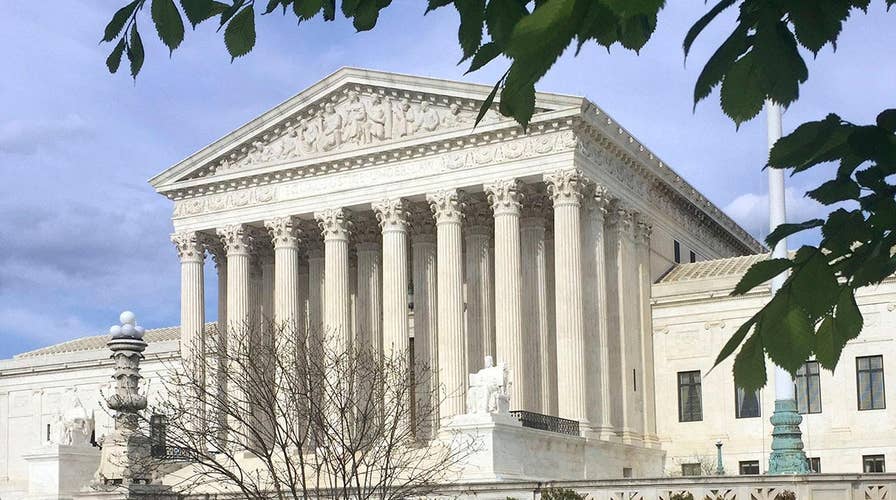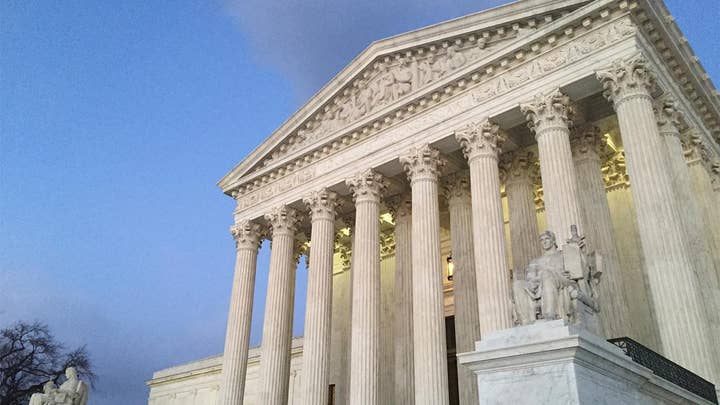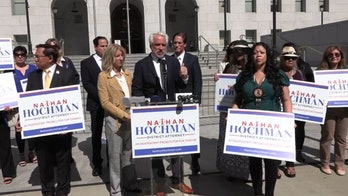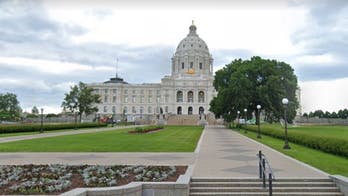Supreme Court passes on two partisan gerrymandering cases
Court avoids ruling on gerrymandering constitutionality in two cases, one from Wisconsin Democrats, the other from Maryland Republicans that challenged redrawn congressional and legislative districts; Doug McKelway reports.
The Supreme Court appeared convinced Tuesday that congressional maps drawn by two state legislatures were overly partisan, but worried whether judges themselves should be the ones to remedy the long-simmering issue.
Partisan gerrymandering may be the wonky side of politics, but the stakes are huge: the balance of power in state legislatures and Congress could tip in coming years, particularly after the 2020 census, when voting boundaries will be redrawn based on population changes.
The justices heard two separate cases. In North Carolina, the 2011 map drawn by the GOP-led legislature now has 10 of 13 congressional seats held by Republicans, despite an overall state population that is mostly divided along party lines, and where statewide elections have recently been close.
And in Maryland, the issue was whether Republican voters could go to court and challenge a redistricting plan they say violated their First Amendment rights. That 2011 voting map shifted the political balance in the state's rural 6th congressional district, turning a traditional GOP stronghold to Democratic control in an overall blue state.
GOP VOTERS WIN GERRYMANDERING LAWSUIT FORCING MARYLAND TO DRAW NEW CONGRESSIONAL MAP FOR 2020
"Under any measure, this is excessive, isn't it?" said Justice Elena Kagan.
"The stated goal was seven/one," Justice Brett Kavanaugh told the lawyer representing Maryland, saying Democrats openly boasted of their efforts to have only one Republican member of Congress. "I mean, I don't think you should run away from the obvious."
A new round of nationwide redistricting will occur after next year's census. Republicans used strong state victories in 2010 to significantly shape electoral maps to their advantage.
The nearly 80-minues of arguments inside the courtroom showed again the justices would be hard-pressed to articulate a clear, definitive ruling on limiting partisanship in the map-drawing process.
The justices have never invalidated a voting district because of an unconstitutional partisan gerrymander. And the targeted questioning from the bench suggested they would not use the pending cases as the precedent to decide the landmark issue.
"The Supreme Court will soon hear arguments over whether politicians can be trusted to draw up their own districts," wrote the governors of Maryland and North Carolina in a joint Washington Post op-ed on Monday. "Take it from us. They can’t."
SUPREME COURT SIDES WITH TEXAS ON GERRYMANDERING DISPUTE
In arguments, lawyer Paul Clement, representing North Carolina lawmakers, pointedly told the court to be wary about wading too deeply into the discretion of lawmakers. "Once you get into the political thicket, you will not get out and you will tarnish the image of this Court."
Justice Stephen Breyer said that was why the court needed to find a "clear standard" going forward. Without it, "you will turn many, many elections in the United States over to the judges," he said. "There's always someone who wants to contest it. They will always find experts of all kinds. And what you'll discover is judges simply deciding too much."
"Have we really reached the moment, even though it would be a big lift for this Court to get involved, where the other actors can't do it?" asked Kavanaugh."
Justice Neil Gorsuch was more pointed: "Why should we wade into this?"
But Justice Sonia Sotomayor and others on the bench pushed back.
"It can't be that simply because the Constitution says that a particular act is in the hands of one branch of government," she said, "that deprives the courts of reviewing whether that action is constitutional or not."
"This is what this is about," she added of the North Carolina map. "You're discriminating on the basis of a group's speech and diluting their vote accordingly."
MYSTERY COMPANY MUST COMPLY WITH SUBPOENA LINKED TO MUELLER PROBE, APPELLATE COURT RULES
Justice Ruth Bader Ginsburg noted previous high court precedent gives it jurisdiction over the issue, including the mandate of giving equal individual weight in legislative apportionment, the so-called "one person, one vote" standard.
"Does one person have one vote that counts equally with others if the impact of her vote is reduced based on her party affiliation?" she asked.
Courts nationwide in recent months have tossed out GOP plans in Virginia, Pennsylvania, and Wisconsin.
Opponents of the plans say their constitutional rights were violated.
Attorney Emmet Bondurant -- who in 1962 successfully argued one of the first partisan gerrymandering case at the high court -- called out GOP lawmakers in North Carolina.
"They take the position that no matter how predominant the intent, no matter how extreme the effects," he told the justices, “there are absolutely no constitutional limitations on partisan gerrymander."
Several conservative justices repeatedly questioned the alternative formulas offered by Bondurant and the attorney opposing Maryland's map.
"I think is going to turn on numbers, right? How much deviation from proportional representation is enough to dictate an outcome?" asked an exasperated Justice Neil Gorsuch. "So aren't we just back in the business of deciding what degree of tolerance we're willing to put up with from proportional representation? We might pluck a number out of the air or see that, you know, maybe two-thirds is used for veto overrides, so we like that. Where are we going to get the number on the business end of this?"
CLICK HERE TO GET THE FOX NEWS APP
More than three-dozen states rely on the state legislature to directly redraw boundaries, now using sophisticated computer models that have the ability target voters by their street or household. Other states such as California rely on an independent commission to create what supporters say would be less extreme districts.
The justices appeared aware of the consequences, with Kavanaugh saying "extreme partisan gerrymandering is a real problem for our democracy -- and I'm not going to dispute that."
But Chief Justice John Roberts stated the obvious in politics -- if one party is enjoying the benefits of a redistricting map, it will be loath to change it.
"I suppose the members of Congress are pretty happy with the way the districting has been done," he said, bringing uneasy laughter in the crowded courtroom.
The North Carolina case is Rucho v. Common Cause (18-422).
The Maryland case is Lamone v. Benisek (18-726). Rulings are expected by June.









